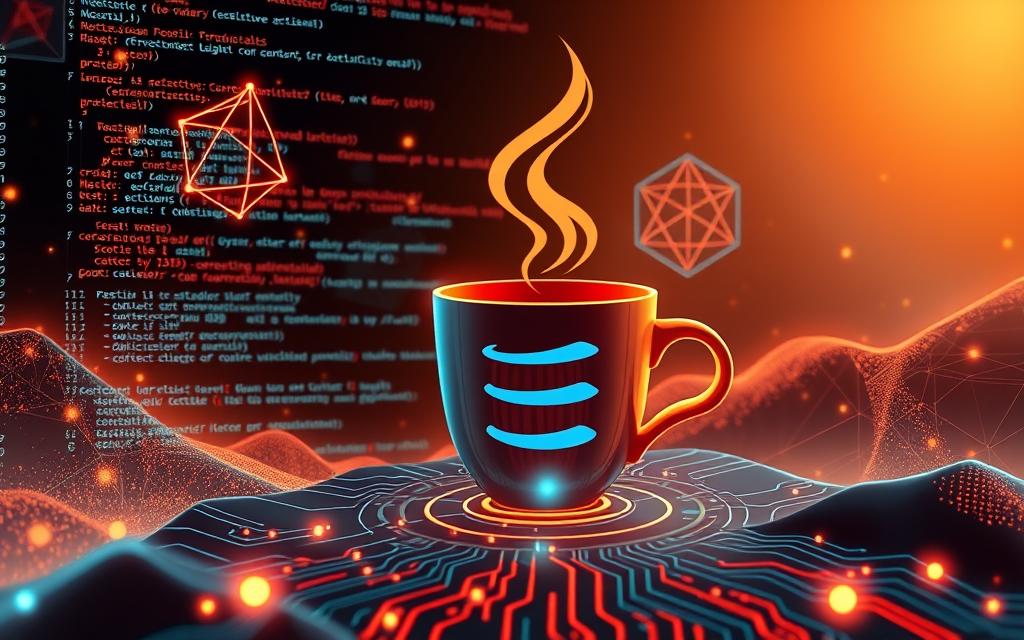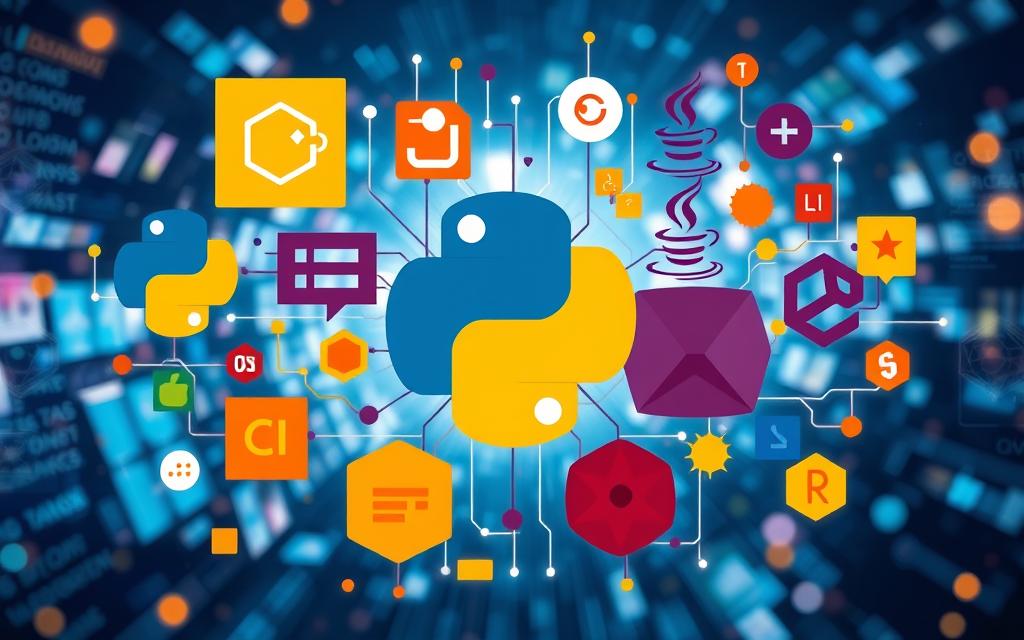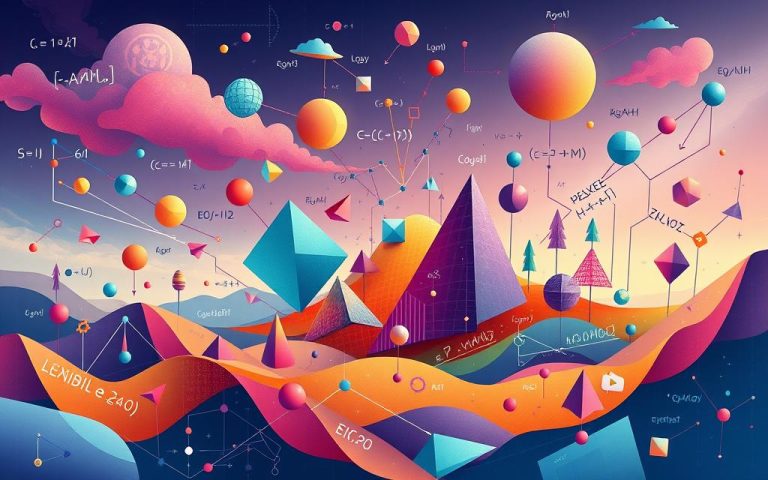Which Programming Languages Are Taught in Computer Science?
Learning programming languages is key for a career in tech. Computer science courses give a solid base in this field. They help people understand the many languages and technologies that power the industry.
For those looking into computer science, it’s important to know that Python, Java, and C++ are often taught. To learn more about these languages, check out programming languages for beginners resources. They offer great insights and tips for starting your coding journey.
Mastering programming languages and finishing computer science courses opens up many career paths. It keeps you ahead in the fast-changing tech world. With the right skills, anyone can thrive in this exciting field, making it a great choice for tech lovers.
Understanding the Role of Programming Languages in Computer Science
Programming languages are key in computer science. Learning to code is vital for any developer. It’s important to understand the link between theory and practice. This means exploring programming fundamentals like data structures and algorithms.
When you start coding, you’ll see that each language has its own use. For web development, JavaScript and PHP are common. Mobile apps might use Java or Swift.
The Relationship Between Theory and Practice
In computer science, theory and practice go hand in hand. Theoretical ideas, like computational complexity, help with practical coding. This knowledge leads to better software solutions.
Why Different Languages Serve Different Purposes
Programming languages have grown to tackle specific tasks. Python is great for data science, while Java is used for Android apps. As technology advances, new languages emerge to meet new challenges.
The Evolution of Programming Languages in Education
Teaching programming languages is key for students’ success. Educators focus on software development and programming basics. Keeping up with new languages and tech is essential for staying relevant.
Python: The Gateway to Computer Science Learning
Python is seen as a top choice for beginners in programming. It’s easy to understand and use, helping new learners get the hang of coding basics. This includes data types, control structures, and functions. Python is also great for data analysis, machine learning, and web development, making it a strong base for further learning.
Learning Python offers many benefits:
- Easy to read and write code
- Extensive libraries and frameworks for various applications
- Large and supportive community of developers
By learning Python, you gain valuable coding skills. Python’s simplicity and flexibility are perfect for starting your computer science journey. With its wide range of uses and growing popularity, Python is a great language to learn for computer science enthusiasts.
For beginners, learning Python is a great start. It lays a solid foundation in programming and coding skills. With hard work and practice, you can fully explore Python’s capabilities, from data analysis to web development.
Java and Object-Oriented Programming Fundamentals
Java is a well-liked programming language in computer science education, mainly for software development. It’s famous for its object-oriented programming (OOP) ideas. These are key for making complex apps. In computer science classes, Java helps students learn coding skills like solving problems and thinking algorithmically.
Learning Java has many benefits:
- It boosts coding skills through practice and projects.
- It helps understand OOP concepts, like classes and objects.
- It opens doors to mobile development, like Android app making.
In software development, Java is very flexible. It’s used for many things, from web apps to mobile apps. By studying Java, students get a better grasp of computer science. They also learn coding skills useful in many areas.

Java is a great choice for computer science education. It gives a strong base for software development and coding. Its OOP ideas and flexibility make it perfect for those aiming for a tech career.
| Programming Language | Key Features | Applications |
|---|---|---|
| Java | OOP concepts, platform independence | Android app development, web development, desktop applications |
C++ and System-Level Programming
C++ is a key part of programming languages in computer science courses. It’s great at working with computer hardware. Knowing the basics of C++ is vital for programmers.
C++ is used in many areas, like operating systems and games. It’s known for its speed and flexibility. Here are some key uses of C++:
- Operating Systems: C++ helps make operating systems and device drivers.
- Games: Games often use C++ for its reliability and performance.
- Embedded Systems: It’s used in systems like traffic lights and robotics.
In computer science courses, C++ is a main topic. It teaches students about programming languages and system-level programming. Learning C++ helps understand how computers work. It’s a rewarding subject for those interested in tech.
| Application | Description |
|---|---|
| Operating Systems | Development of operating systems, device drivers, and other low-level system software |
| Games | Development of games due to its performance, reliability, and flexibility |
| Embedded Systems | Development of embedded systems, such as traffic light control systems and robotics |
What Programming Language Do You Learn in Computer Science: A Comprehensive Overview
In computer science, students can pick from many programming languages. The choice depends on their tech career goals. A strong base in programming fundamentals is key to success.
Learning to solve problems is a big part of computer science. Websites like MPC Site help improve these skills for computer science success.
First-Year Programming Languages
First-year students usually start with Python or Java. These languages are great for beginners. They’re easy to learn and very versatile.
Advanced Language Studies
Later, students dive into languages like C++ or Haskell. These languages help deepen computer science knowledge. They’re used in specific fields and require a solid understanding of programming fundamentals.
Specialisation Options
With a good base in programming fundamentals, students can specialise. They can focus on web development, artificial intelligence, or data science. Each area needs specific skills and languages, leading to a fulfilling tech career.

Knowing about different programming languages helps students choose their tech career path. Whether you’re starting or looking to grow, there are many resources to help you in computer science.
Functional Programming with Haskell and Scheme
Functional programming is key in computer science education. Haskell and Scheme are important in this area. They help teach a way of programming that focuses on what the program should do, not how it does it.
In this style, pure functions are very important. Pure functions always give the same output for the same inputs, without changing anything else. This makes programs easier to understand and work with.
Understanding Pure Functions
Pure functions help make code that can be used over and over again. They don’t change anything outside of themselves. This makes testing and improving code easier. Haskell and Scheme use pure functions a lot to solve problems.
Mathematical Foundations
Functional programming is based on math, and Haskell and Scheme show this. They use things like recursion and special types to help solve problems. Learning about functional programming with these languages helps students understand the math behind programming.

By learning about functional programming with Haskell and Scheme, students get a better grasp of programming languages. They see how these languages are used in computer science education.
Web Development Languages: JavaScript and PHP
Web development is a thrilling field for those new to programming languages for beginners. It’s about making websites that are alive and interactive. JavaScript and PHP are key to this, helping developers build complex web apps and user-friendly interfaces.
JavaScript is a top choice for making web pages that work well and are fun to use. PHP, on the other hand, is for the back-end, making websites dynamic and able to talk to databases. Together, they’re vital for web development and help create full-featured web apps.
- Front-end development: creating user interfaces and user experiences using JavaScript, HTML, and CSS
- Back-end development: creating server-side logic and interacting with databases using PHP and other languages
- Full-stack development: combining front-end and back-end development to create complete web applications
Learning programming languages for beginners like JavaScript and PHP is a great start. It sets a strong base for web development and opens doors to a rewarding career in this field.
Database Languages: SQL and NoSQL
Database languages are key in computer science education. They help students manage and analyze big data. In software development, SQL and NoSQL are used to create databases for different apps.
Learning to code in database languages is vital for software developers. With more data being created, the need for database experts is growing.
Relational Database Concepts
Relational databases use tables, queries, and indexes. They’re common in finance, healthcare, and e-commerce.
Modern Database Solutions
NoSQL databases are for handling lots of unstructured data. They’re great for social media, IoT, and big data analytics.
Database languages have many uses:
- Data analysis and reporting
- Data mining and business intelligence
- Web and mobile app development
Mastering database languages can give students an edge in the job market. It leads to a successful career in software development and computer science education.
| Database Language | Application |
|---|---|
| SQL | Relational databases |
| NoSQL | Big data analytics |
Emerging Languages in Computer Science Education
New programming languages are coming out as tech advances. In computer science classes, students learn about Rust, Go, and Swift. These languages are changing how we do system programming, cloud computing, and mobile app development. They’re helping students get ready for a bright tech career.
Rust and System Programming
Rust is a language that focuses on safety and speed. It’s used in making operating systems and file systems. Developers can make fast, reliable, and safe software with Rust. This makes it a great choice for companies wanting to invest in programming.
Go and Cloud Computing
Go, or Golang, was made by Google for building scalable systems. It’s perfect for cloud computing and is used by Netflix and Dropbox. Go is simple and efficient, making it great for developers who want fast and reliable software.
Swift and Mobile Development
Swift is Apple’s language for iOS, macOS, watchOS, and tvOS apps. It helps developers make powerful, modern apps easily. With Swift, apps are fast, reliable, and secure. This makes it a good choice for companies in mobile development.
These new languages are changing computer science education and opening up new career paths. As the need for skilled developers grows, it’s key for students to keep up with the latest programming languages and technologies.
| Language | Application | Benefits |
|---|---|---|
| Rust | System Programming | Safety, Performance, Reliability |
| Go | Cloud Computing | Scalability, Concurrency, Simplicity |
| Swift | Mobile Development | Power, Modernity, Security |
How Programming Languages Shape Your Career Path
In today’s world, learning to code is essential. It opens doors to many career paths. With coding skills, you can work in software development, data analysis, and web development, among others.
Programming languages are key in several areas:
- Software development: needs skills in Java, Python, and C++
- Data analysis: uses R, SQL, and Python
- Web development: involves JavaScript, HTML, and CSS
As you learn to code, you’ll see different languages fit different tasks and industries. For example, Python is great for data science and machine learning. Java is often used for Android app development. Learning programming fundamentals helps you fit into various industries and stay competitive.
Building strong coding skills takes effort and practice. But, it can lead to great career opportunities. With technology always changing, the need for skilled programmers is growing. By picking the right language and learning, you can shape your career and succeed in tech.
Conclusion: Mastering Languages for Technical Excellence
Starting your computer science journey? Remember, mastering programming languages is key. Python is easy to learn, while C++ is great for system-level tasks. Each language helps you grow and move forward in your career.
Learning different languages opens many doors. You could become a software engineer, data analyst, or AI researcher. Java teaches object-oriented programming, Haskell shows the beauty of functional programming, and JavaScript and PHP are perfect for web development.
The journey to technical excellence is all about learning and adapting. Stay curious and keep learning new languages. This will lead you to a fulfilling career in computer science.
FAQ
What are the most commonly taught programming languages in computer science?
In computer science, you’ll learn Python, Java, C++, JavaScript, and SQL first. These languages are the foundation for many areas, like web and mobile apps, and system programming.
How do programming languages relate to the theory and practice of computer science?
Programming languages connect computer science theory to real-world use. They help turn algorithms and problem-solving into working software. The right language depends on the project’s needs, like speed or compatibility.
Why is Python considered a gateway to computer science learning?
Python is great for beginners because it’s easy to learn and versatile. It’s perfect for learning programming basics. Plus, it’s used in many fields, from data analysis to web development.
What are the key concepts and applications of Java in computer science?
Java is key in computer science for its object-oriented programming. It’s great for complex apps, like enterprise software and games. Its safety and compatibility make it useful in many areas.
How does C++ support system-level programming in computer science?
C++ is used for working with computer hardware and low-level software. It lets programmers access memory and other system parts. This makes it ideal for operating systems and device drivers.
What are the common programming languages learned in a computer science degree program?
Computer science students start with Python, Java, and C++ in their first year. Later, they might learn Haskell, Scheme, JavaScript, PHP, and SQL. The languages depend on the program’s focus.
How do functional programming languages like Haskell and Scheme contribute to computer science education?
Haskell and Scheme teach programming through pure functions and math. They’re important for learning recursion and type systems. This helps students understand computer science’s theoretical side.
What is the role of web development languages like JavaScript and PHP in computer science?
JavaScript and PHP are key for web development. JavaScript is for front-end work, making web pages interactive. PHP is for back-end, powering web apps and systems. Knowing these languages is essential for web careers.
How do database languages like SQL and NoSQL contribute to computer science education?
SQL and NoSQL teach data management. SQL is for relational databases, while NoSQL is for flexible data storage. Learning these languages is vital for managing complex data systems.
What are some emerging programming languages in computer science education, and how do they shape career opportunities?
New languages like Rust, Go, and Swift are emerging. Rust is for system programming, Go for cloud computing, and Swift for iOS apps. Learning these languages can lead to diverse careers in tech.
How do programming languages shape a computer science career path?
The languages you learn shape your career. Each language is linked to specific areas, like web development or data analysis. Knowing these languages helps align your skills with your career goals.














